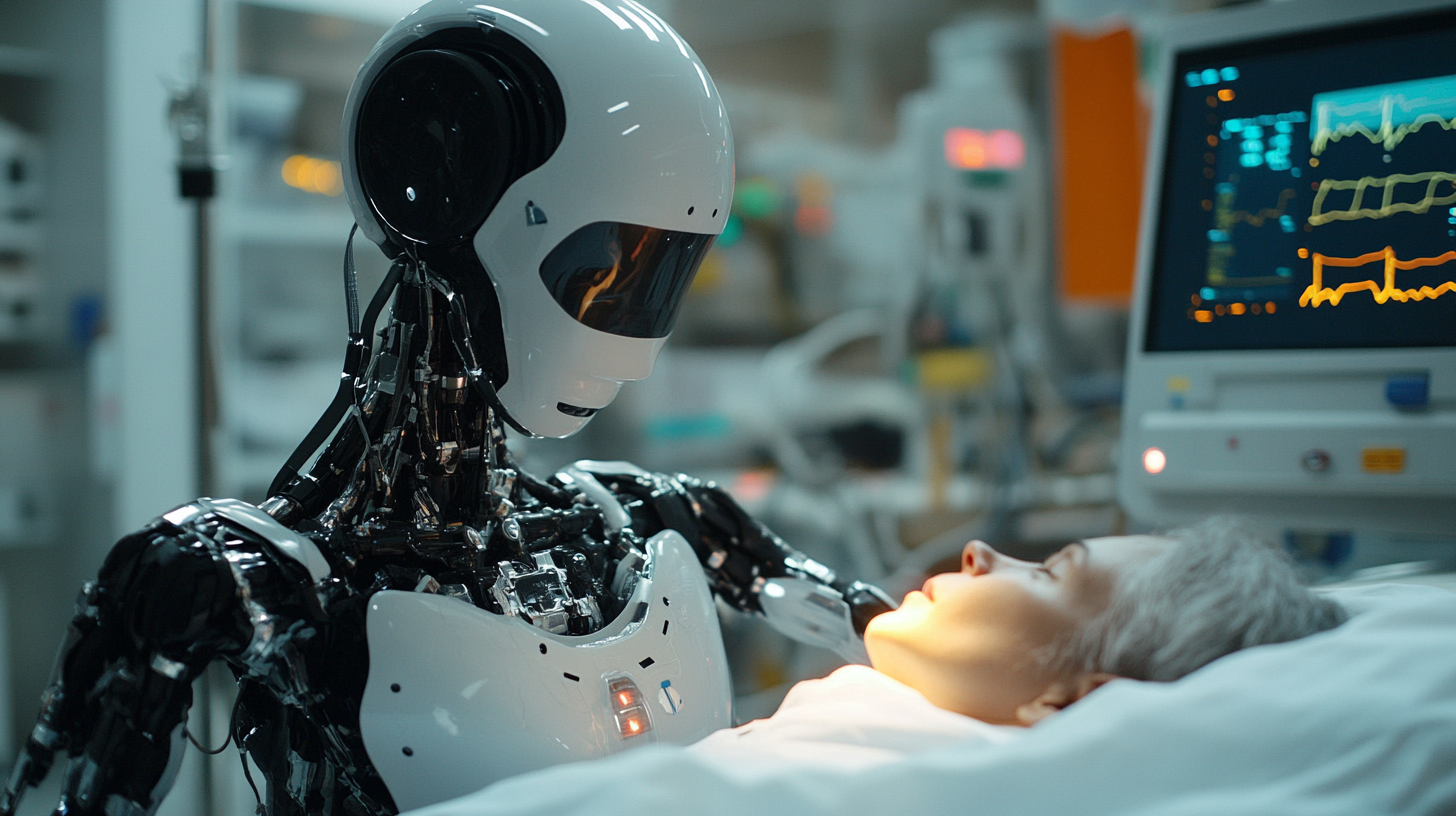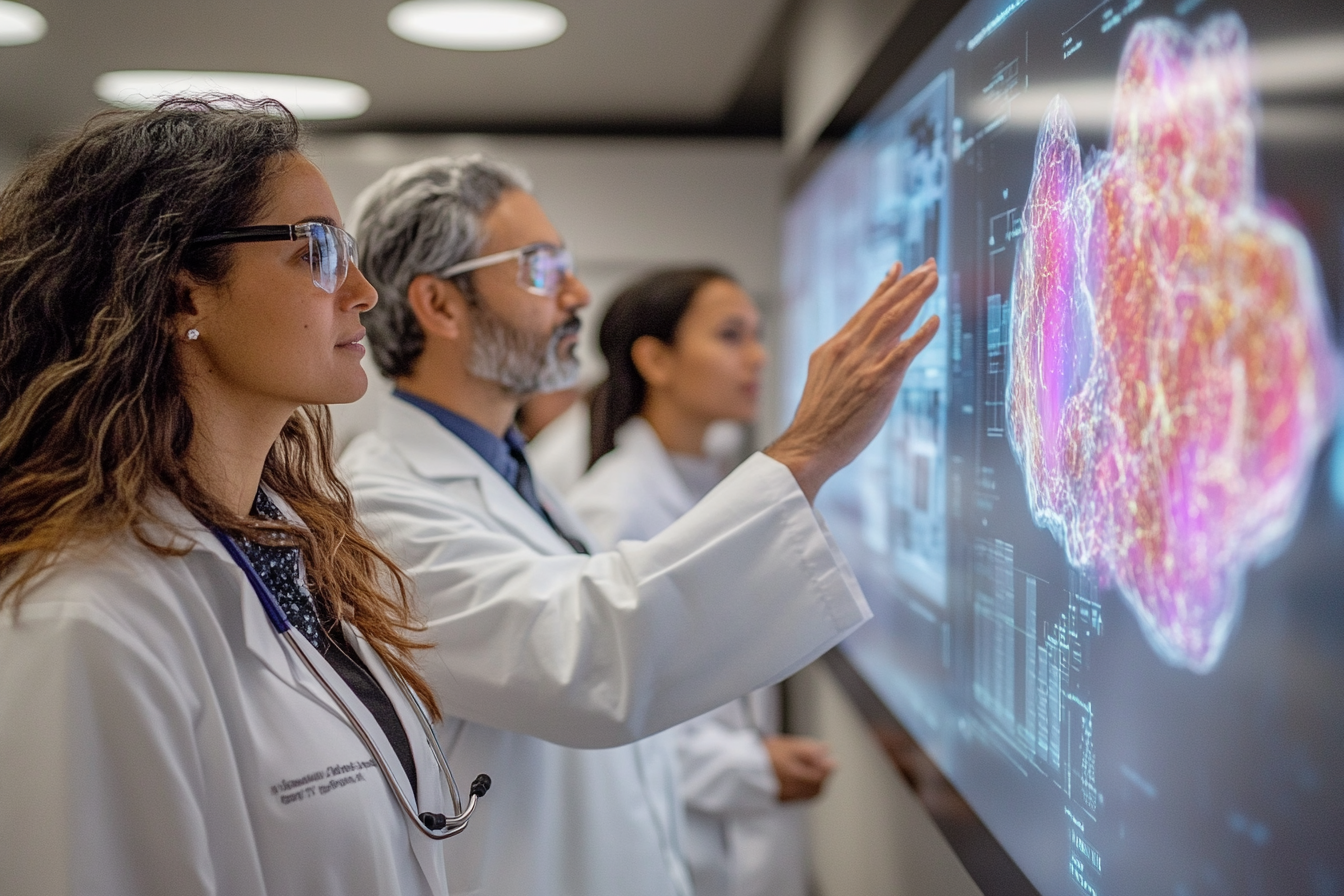AI in Cancer Research (2024-2025)
Artificial intelligence (AI) is rapidly transforming various sectors of society, and healthcare is no exception. In the field of oncology, AI is proving to be a game-changer, impacting how we understand, diagnose, and treat cancer.
This article explores the significant developments in AI-driven cancer research and treatment in 2024 and 2025, highlighting its capabilities, limitations, and potential future applications.
Listen to Podcast
Research Methodology
The information presented in this article is based on a thorough review of research papers, medical journals, and news articles published in 2024 and 2025. Only reputable sources, including government websites and academic publications, were considered.
The research focused on AI applications in cancer development, specifically in the areas of research and treatment.
AI in Cancer Research
Early Detection and Diagnosis
AI is revolutionizing cancer detection by enhancing the analysis of medical images. In 2025, AI algorithms are being used to analyze mammograms and predict the risk of breast cancer years before a clinical diagnosis. This technology allows for personalized preventive treatments and more effective care. AI is also being used to improve the accuracy of skin cancer diagnoses. The DermaSensor, approved by the FDA in January 2024, provides a non-invasive way to diagnose all types of skin cancer at the point of care with high sensitivity.
In 2024, Stanford Medicine developed an AI program called SEQUOIA that can analyze microscopy images from tumor biopsies and rapidly determine the active genes in the cells. Researchers also developed an AI model in 2025 to detect the spread of metastatic brain cancer using MRI scans, offering insights into a patient’s cancer without aggressive surgery.
Share This Post
Treatment Optimization and Personalization
Enhanced Image Analysis
AI algorithms are improving how radiologists detect and treat cancer by enhancing image analysis. AI can provide clinicians with crisper images with less noise and better analytics, leading to a fuller and truer diagnostic picture. This enables earlier and more informed treatment decisions, potentially increasing a patient’s chances of remission and long-term survival.
Predicting Treatment Outcomes
AI is being used to predict treatment outcomes and enable personalized care. By integrating imaging and medical device data, AI can help clinicians manage the complexity of cancer and optimize care for each patient. For example, AI-assisted diagnostic software for early-stage lung cancer can improve the sensitivity and specificity of malignancy assessments. Furthermore, in 2025, Stanford Medicine researchers developed an AI model that combines data from medical images with text to accurately predict prognoses for cancer patients.
Analysing Tumour Biology
AI is helping researchers gain a deeper understanding of tumour biology. By analysing vast amounts of data, AI can identify patterns and predict the rate of tumour growth and aggressiveness.
This information can help inform patient monitoring strategies and treatment modifications.
Drug Discovery and Development
Accelerating Drug Discovery
AI has the potential to accelerate the costly and time-consuming process of discovering and developing new cancer drugs. AI models are being used to predict potential cancer drug targets in liver cancer and breast cancer. AI systems are also helpful in analyzing large datasets to identify subsets that may be relevant for a particular predictive tool. This capability of AI to analyze large datasets and identify potential drug targets has the potential to revolutionize personalized medicine by tailoring treatments to individual patients’ genetic and molecular profiles.
Collaborative Initiatives
In October 2024, four major cancer centers formed the Cancer AI Alliance (CAIA) to leverage AI and shared data for new cancer discoveries. Supported by tech leaders like AWS and Microsoft, CAIA aims to produce insights by the end of 2025.
AI in Cancer Treatment
Personalized Treatment Plans
AI is enabling more personalized cancer treatment plans. By analysing a patient’s data, including genetics, gut microbiome, tumour genetics, radiological imaging, and cytokine panels, AI can predict the best treatment options.
This could include standard approved agents, supplements, off-label drugs, and experimental medications.
Optimizing Cancer Therapies
AI is being used to optimize cancer therapies, particularly in preventing patient relapse. In 2024, an Oxford University study demonstrated how an AI-driven approach could tailor cancer therapies more effectively. The researchers applied deep reinforcement learning to create adaptive therapy schedules for prostate cancer patients, more than doubling the time to relapse compared to conventional treatment methods.
Standardizing Surgical Outcomes
AI is being used to standardize surgical outcomes and improve the training of oncologic surgeons. By using AI in surgeries for prostate cancer, for example, surgeons can experience the same quality outcome regardless of their location. This also has implications for training, as AI can help standardize surgical techniques and improve the skills of surgeons. By standardizing surgical techniques and providing real-time feedback during procedures, AI can contribute to improved patient safety and reduced surgical complications.
Challenges and Limitations of AI in Cancer
Despite the remarkable potential of AI in oncology, several challenges and limitations need to be addressed.
Data Quality and Access
One of the main challenges of AI in oncology is data quality and access. AI models require large amounts of high-quality data for training and validation. Incomplete or inconsistent data can lead to inaccurate predictions and biased outcomes. Access to diverse and representative datasets is crucial to ensure that AI models are generalizable and applicable to all patient populations.
Interpretability and Explainability
Another challenge is the interpretability and explainability of AI-based predictions. It can be difficult for clinicians to understand how AI models arrive at their conclusions, which can hinder trust and adoption in clinical practice. Explainable AI (XAI) is an emerging field that aims to develop AI models that can provide insights into their decision-making processes, making them more transparent and understandable to humans.
Ethical Considerations
Ethical considerations are also crucial in the use of AI in cancer care. Issues such as patient consent, data privacy, and the potential for bias need to be carefully addressed to ensure responsible and ethical implementation. It is essential to ensure that AI models are developed and used in a way that respects patient autonomy, protects sensitive health information, and avoids perpetuating existing health disparities.
Future Applications of AI in Cancer
The future of AI in cancer care holds immense promise. Continued research and development in this field are expected to lead to even more groundbreaking advancements in the years to come.
Precision Medicine
AI is expected to play an even greater role in precision medicine in the future. By analyzing individual patient data, AI can help identify the most effective treatments and predict treatment response, disease course, and prognosis. This will enable clinicians to tailor treatments to each patient’s specific needs and characteristics, leading to more personalized and effective cancer care.
Early Detection and Prevention
AI has the potential to revolutionize cancer detection and prevention. With the use of AI, there is renewed hope in significantly enhancing cancer detection, particularly in identifying patients at higher risk for specific types of cancer. This will allow for earlier interventions and preventive measures, potentially reducing cancer incidence and mortality rates.
Drug Development
AI is expected to continue to accelerate the drug discovery and development process. By analyzing large datasets and identifying potential drug targets, AI can help bring new and more effective cancer treatments to patients faster. This will not only improve patient outcomes but also reduce the time and cost associated with traditional drug development methods.
Share This Post
Conclusion
AI is transforming cancer research and treatment in remarkable ways. From early detection and diagnosis to personalized treatment plans and drug discovery, AI is improving patient outcomes and shaping the future of oncology. While challenges remain in terms of data quality, interpretability, and ethical considerations, the potential of AI to revolutionize cancer care is undeniable.
The ethical and societal implications of AI in cancer care need to be carefully considered. Ensuring equitable access to AI-powered technologies, protecting patient privacy, and addressing potential biases are crucial for responsible implementation. Continued research and collaboration among researchers, clinicians, and technology developers are essential to overcome these challenges and unlock the full potential of AI in cancer care.
Ultimately, the goal is to harness the power of AI to improve patient outcomes, reduce cancer burden, and advance the field of oncology. By promoting responsible development and implementation, AI can be a powerful tool in the fight against cancer, leading to a future where cancer is prevented, detected early, and treated effectively for all.










